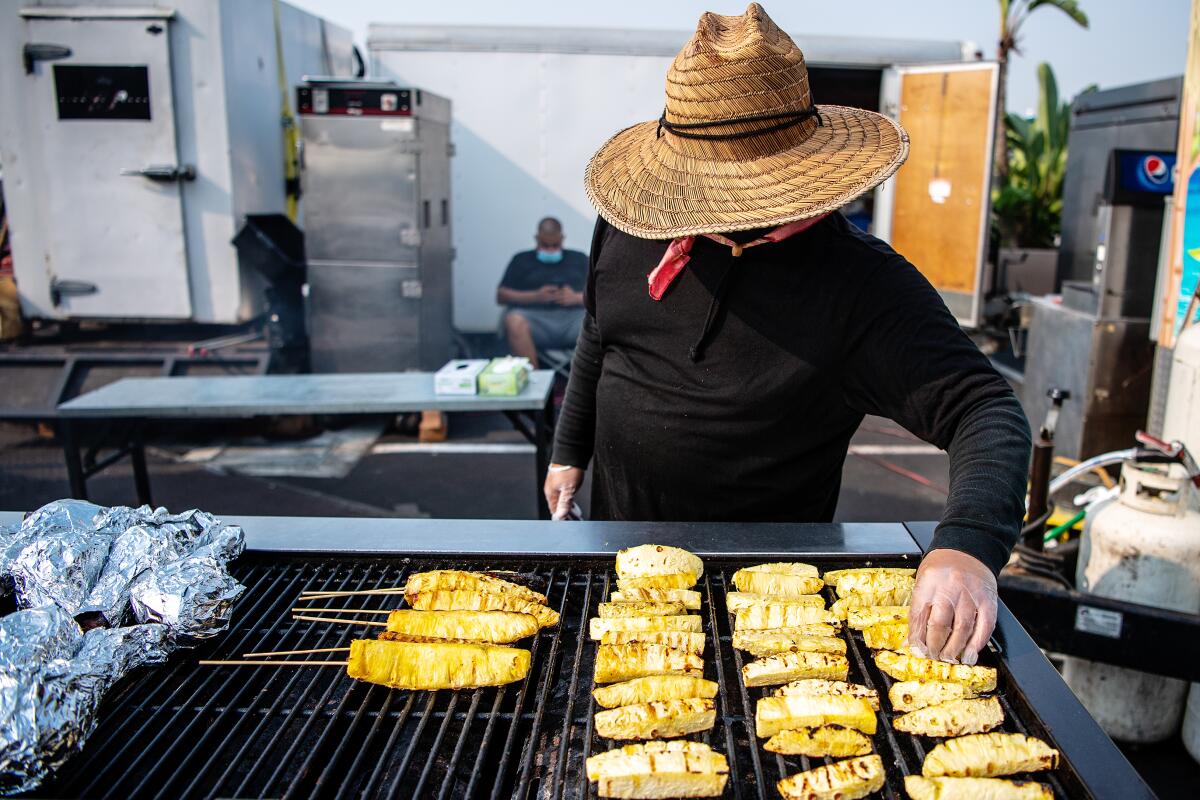Latinx Files: TikTok creator becomes guardian angel for California food vendors

Meet Jesus Morales, the TikTok content creator that has become a guardian angel for several street vendors in California.
The 24-year-old who goes by @Juixxe has gone viral on the social media platform by filming himself giving $1,000 in cash to unsuspecting people selling food or merchandise on the street. The money is crowdsourced from his more than 1 million followers. To date he has raised and handed out $90,000, mostly to vendors in Los Angeles.
For the record:
10:50 a.m. May 13, 2021An earlier version of this post referred to UTEP as the University of El Paso. UTEP is the University of Texas at El Paso.
Morales told CalMatters that he drew his inspiration from his immigrant parents.
“My dad worked multiple jobs, and my mom was a server, and she would tell me that sometimes people would tip her pennies,” Morales said.
The Latinx experience chronicled
Get the Latinx Files newsletter for stories that capture the multitudes within our communities.
You may occasionally receive promotional content from the Los Angeles Times.
As has been the case with any group of marginalized people, the COVID-19 shutdown has been hard on food vendors. At the start of the pandemic, the Los Angeles City Council lifted a moratorium on ticketing people selling food without a permit because of health concerns. As my colleague Emily Alpert Reyes reported, the council considered formally reinstating the moratorium in March but has yet to do so.
“I do not know [the sellers] nor do I know what they are going through,” Morales said. “I would not say that I come at a perfect time, but it is a visit with a purpose.”
Consider subscribing to the Los Angeles Times
Your support helps us deliver the news that matters most. Become a subscriber.
Happy 175th anniversary to Congress declaring war on Mexico!
Today marks the 175th anniversary of the United States Congress declaring war on Mexico, an event so significant it created an entire group of people.
“That’s why Mexican Americans exist, because of the fact that there was this war of conquest that was driven by the notion of ‘Manifest Destiny,’ a term coined in conjunction with all of this,” said Ernesto Chavez, a history professor at the University of Texas at El Paso and author of “The U.S. War With Mexico: A Brief History with Documents.”
“Manifest destiny,” the idea that it was the United States’ divine right to expand to the Pacific, was coined in 1845 by John O’Sullivan in an editorial that argued for the annexation of Texas and the Oregon territory.
The U.S. government blamed its southern neighbor for the start of the war. President James K. Polk, who ran on a platform of western expansion, claimed Mexico had shed “American blood on American soil,” conveniently leaving out the fact that the land in which the soldiers killed in what became known as the Thornton Affair was Mexican at the time.
The end of the war resulted in the U.S. nearly doubling in size, acquiring land that is now present-day California, Nevada, Utah, Arizona, Wyoming, Colorado, New Mexico and Texas.
It was also a prelude to the Civil War; the expansion further heightened the slave state vs. free state debate. In fact, known racist and secessionist John C. Calhoun was opposed to the Mexican-American War precisely for this reason. (He was also against the idea of acquiring all of Mexico because that would mean more Mexicans).
For Chavez, the legacy of this declaration of war is very much alive.
“The U.S.-Mexico War opened the door for the United States to have that neocolonial relationship with Mexico and Central America,” he said, noting that the power imbalance has given the U.S. access to cheap labor and resources ever since.
“It’s important for people to think about how they are products of history, and why this relationship between these countries exists.”
Meet our readers: Joshua Rivera

As I mentioned in the inaugural newsletter, the Latinx Files belongs to you. Not only do I want to hear from you about what you’d like for me to cover, but I also want to carve out space for you to tell us about your Latinx experience.
I met Joshua Rivera, a 35-year-old software developer, earlier this year in his hometown of Albuquerque as I was making my way west to California from Texas. A proud Burqueño, the 35-year-old and I spoke about soccer (in addition to Barcelona, he roots for the Spanish and U.S. men’s national teams and local club New Mexico United), hiking trails, bilingualism (he doesn’t speak Spanish), New Mexican food and culture. But what struck me the most in our two-hour long conversation was the manner in which he described his Mexican American identity:
“I’m very proud of it. I’m pretty whitewashed. I understand that. It doesn’t change that I’m proud of my heritage. I understand where my grandparents came from, and I understand the sacrifices my parents made. When I say I’m Mexican, I think that’s really what it is, I understand that people put in effort to get me where I am today. I like to say that you’re essentially other people’s collective efforts. Your grandparents’ collective effort got so far, and then your parents build on that. It’s hard to put into words, but I’m very proud of that.”
Latinx voters really turned out in 2020
According to a new study from the City University of New York, more than half of Latinx voters eligible to vote in 2020 actually cast a ballot in the presidential election — a historic first.
In total, approximately 18.7 million Latinxs voted last November, accounting for one out of every 10 voters nationally, the researchers found. The study also found that 60% of all registered Latinx voters were between the ages of 18 and 44, and that Latinxs born in the U.S. voted at the same rate as naturalized Latinxs.
“For the first time, there are more Latinos registered than African Americans and we know that trend is going to continue,” Luis Miranda, a Democratic consultant, told NBC News.
If this isn’t a wake-up call to politicians who have long ignored the Latinx electorate, I don’t know what is.
The best thing on the Latinternet: Latinxs celebrating Mothers’ Day
Sunday was Mother’s Day (and Monday was also Mother’s Day for Mexican, Salvadoran and Guatemalan moms), and my timeline was blessed by countless posts of Latinx folks celebrating their mommas, people whose collective effort is responsible for us being here in the first place.
Some of you went all out and serenaded your mamis with mariachi. Others secretly flew across the country to surprise an unsuspecting mom. And then there’s the case of my friend Alberto Perez, who surprised his mom with a private opera performance.
The Latinx experience chronicled
Get the Latinx Files newsletter for stories that capture the multitudes within our communities.
You may occasionally receive promotional content from the Los Angeles Times.




